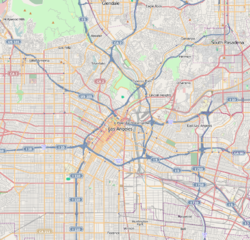|
Angelino Heights, Los Angeles
Angelino Heights, alternately spelled Angeleno Heights, is one of the oldest neighborhoods in Los Angeles. Situated between neighboring Chinatown and Echo Park, the neighborhood is known for its concentration of eclectic architectural styles from three eras: Victorian, Turn of the Century and Revival.[2][3] Carroll Avenue is listed on the National Register of Historic Places and there are over thirty Historic-Cultural Monuments in the neighborhood. History Newspaper advertisement, March 28, 1906   Originally spelled Angeleno Heights, Angelino Heights is second only to Bunker Hill as the oldest district in Los Angeles outside of Downtown. Founded in 1886, it was originally connected to the downtown mainline (which ran east to west on Temple Street) by the Temple Street Cable Railway and later by streetcars. It is known for its steep hills. The district contains many notable examples of Victorian architecture, particularly of the Eastlake and Queen Anne styles, and though found throughout the neighborhood, they are especially concentrated on Carroll Avenue. Traveling around the neighborhood, one also discovers that many other styles of architecturally significant homes are to be found here, such as Craftsman, Bungalow, Mission Revival, Art Deco, and Colonial Revival, to name a few. A large swath of Angelino Heights was destroyed to build the Hollywood Freeway, which cut it off from Temple Street save for an overpass at Edgeware Road. Angelino Heights was the City of Los Angeles' first recognized historic district. The Angelino Heights Historic Preservation Overlay Zone (HPOZ) was enacted in 1981 and prohibits unsympathetic remodeling of historic houses and requires new construction to resemble original architecture in scale, massing and materials.[3] GeographyAngelino Height's boundaries include the Hollywood Freeway to the south, Sunset Boulevard to the north and east, and Echo Park Lake to the west. Sunset Boulevard is the main thoroughfare. [2] Angelino Heights is situated on a hill of about 502 feet in elevation.[4]  Police serviceThe neighborhood is served by the Los Angeles Police Department's Rampart Community Police Station located at 1401 West 6th Street.[5] EducationAngelino Heights is zoned to Los Angeles USD schools.[6] For elementary school, residents are zoned to either Plasencia Elementary School or Logan Elementary. For middle school, residents are zoned to either King Middle School or Virgil Middle School. For high school, all residents are zoned to Belmont High School. National Register and Historic-Cultural MonumentsThe 1300 block of Carroll Avenue (between Edgeware and Douglas Streets) is listed in the National Register of Historic Places.[7] It contains the highest concentration of 19th century Victorian homes in Los Angeles. Additionally, there are over 30 homes in Angelino Heights that have been designated as Historic-Cultural Monuments.[8] In media
References
External linksWikimedia Commons has media related to Angelino Heights, Los Angeles. |
||||||||||||||||||||
Portal di Ensiklopedia Dunia

